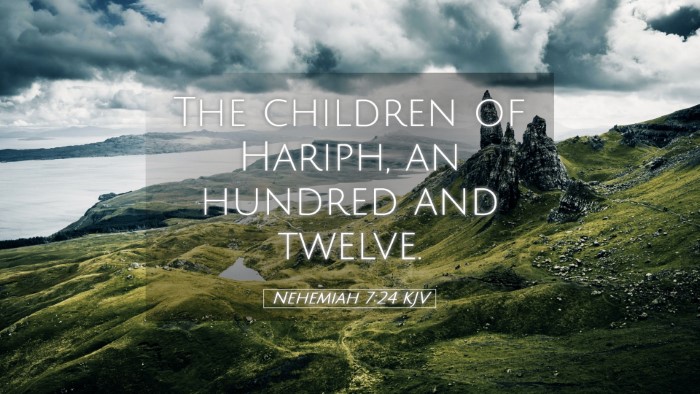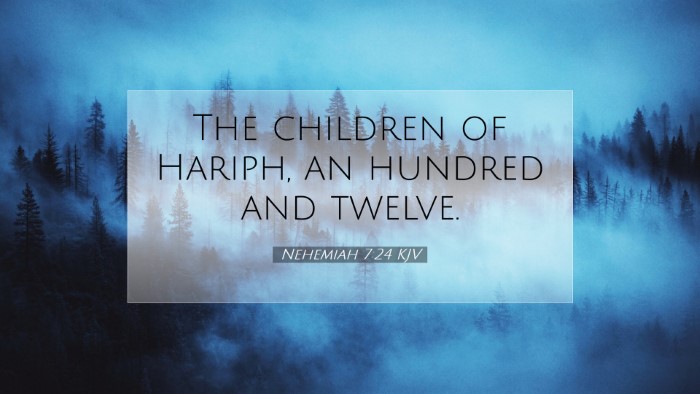Commentary on Nehemiah 7:24
Contextual Overview
Nehemiah 7:24 mentions a specific group of individuals in the post-exilic Jewish community, particularly focusing on the inhabitants of the towns and their genealogies. This verse is part of a larger historical narrative in which Nehemiah is recording the return of the exiles to Jerusalem and the organization of the community.
Verse Analysis
Nehemiah 7:24 states: "The sons of Banai, the sons of the other people, the sons of the priests, and the Levites." This verse serves as a genealogical record within the broader context of restoration and rebuilding efforts after the Babylonian exile.
Genealogical Importance
- Identity and Heritage: The importance of genealogies in the Old Testament cannot be overstated. It served as a means to establish identity, heritage, and eligibility for priestly duties and land inheritance.
- Consolidation of Community: The enumeration of families and individuals contributed to the sense of belonging and continuity amid the community's restoration efforts.
- God's Faithfulness: The listing also reflects God’s faithfulness to His covenant promises, as these descendants were witnessing the fulfillment of God's plan for Israel.
Insights from Public Domain Commentaries
Matthew Henry
Matthew Henry emphasizes the importance of family lineage in the community of Israel, noting that this genealogical record was vital not only for historical records but also to encourage the people in their spiritual heritage. He points out that by documenting these families, Nehemiah was reinforcing their significance in God's plan.
Albert Barnes
Albert Barnes provides a detailed exposition of the societal structure outlined in this verse. He notes that Nehemiah specifies multiple groups, including the sons of Banai and other people, indicating a diverse population returning to Jerusalem. Barnes highlights the unity of the returning exiles and how their different backgrounds contributed to the vibrant community that God was establishing.
Adam Clarke
Adam Clarke elaborates on the tribes and their importance, noting that the Levites, as teachers and custodians of the law, had significant roles in the rebuilding of Jerusalem. Clarke also underscores the spiritual ramifications of organization by stating that such listings reinforce the legitimacy of the newly restored community and establish a clear understanding of each individual's role in the service of God.
Theological Reflections
As we reflect on Nehemiah 7:24, we are reminded of several theological themes:
- Community Restoration: The efforts to rebuild Jerusalem were not merely physical; they represented a deeper spiritual renewal as well. The communal aspects of this restoration indicate that God calls His people to work together in unity.
- Historical Consciousness: The genealogies serve as a reminder of God's enduring faithfulness across generations. The presence of specific family names ties the community's past to its present, emphasizing the importance of historical awareness in faith.
- Role of Leaders: Nehemiah's meticulous attention to detail and documentation serves as an example for leaders today. It reflects the need for integrity and regard for the community being served.
Applications for Today
This verse and its surrounding context can be applied in modern ministry:
- Emphasizing Heritage: Recognizing and valuing the diverse backgrounds within a congregation can foster unity and mutual respect.
- Building Community: Just as the exiles worked together to restore Jerusalem, modern believers are called to collaborate in serving their communities and advancing the Kingdom of God.
- Documenting Spiritual Heritage: Creating records of church history and genealogies of faith can provide encouragement and a sense of belonging for both current and future generations.
Conclusion
Nehemiah 7:24 serves not only as a historical record but also as a powerful reminder of God's faithfulness and the importance of community in the people of God. The diligent actions of Nehemiah, along with insights from public domain commentators, help us appreciate the depth of this verse. It teaches us lessons about identity, heritage, unity, and the importance of working together as God's chosen people.


